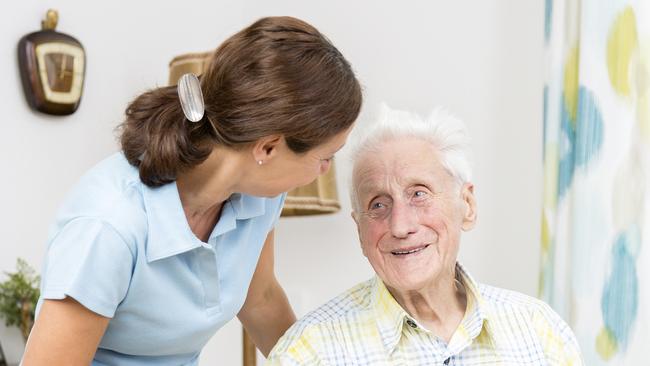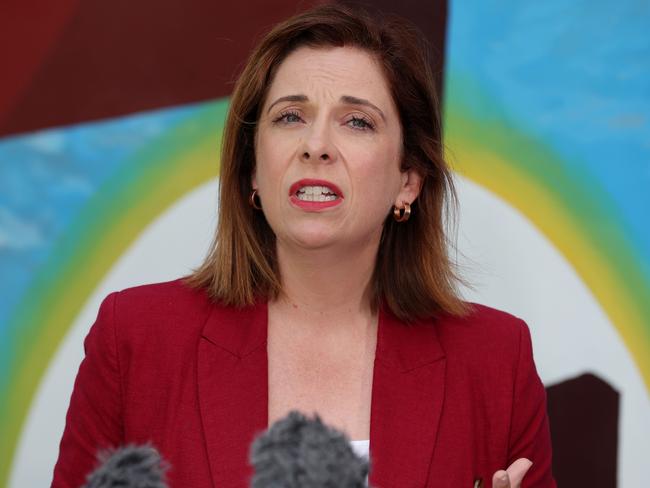CHA urges rental help for aged-care workers in transition to new system
Catholic Health Australia has called on Labor to subsidise rents for its staff, as it warns older Australians will pay more for care without a radical boost in government funding.

The country’s biggest not-for-profit provider of health and aged-care services has called on Labor to subsidise rents for its staff, as it warns older Australians will pay more for care without a radical boost in government funding to help providers transition to the new aged care system.
Catholic Health Australia, which represents 350 aged-care facilities nationally and around 20 per cent of home services, said the passage of milestone aged-care reforms through parliament in November would “cost the sector hundreds of millions of dollars”, and urged more financial aid to be put on the table.
“To comply with the Aged Care Act, providers have to make substantial changes such as overhauling their ICT systems, training staff and switching older Australians to the new Support at Home program,” CHA chief executive Jason Kara said.
The government expects the new structure to save the budget $12.6bn over 11 years by keeping more people out of residential care and ensuring those who do go into aged-care facilities pay more if they can afford to.
But in its pre-budget submission, seen by The Australian, CHA said retaining the staff needed for the new system would be a challenge without programs that could ensure they lived close by those they were caring for.
“Many aged-care services are clustered in suburbs where affordable housing and rental properties are not available,” the submission read. “CHA recommends that the government subsidise suitable accommodation close to where nurses work. This could be implemented by introducing additional salary packaging allowances for nurses renting within a certain proximity to work.”
The peak body also raised the need to reintroduce exemptions of the fortnightly 48-hour working hour cap for international students studying in aged care, allowing the cohort to better help fill staff shortages.

As part of its bid to close gaps in the aged-care workforce, Labor pumped more than $11bn into increasing minimum award rates for staff by 15 per cent, leading to a 25 per cent increase in workers.
CHA’s demands call into question the degree of extra funding the government will need to allocate on top of the wage rises and its signature $5.6bn aged-care reforms, which are set to feature heavily in an election pitch to voters on Labor’s commitment to the care economy.
Despite the government having offered $10,000 grants to help providers transition to the new system, CHA said the funding was not nearly enough to support the sector through the reforms. “Fundamentally, the funding model must meet the true costs providers face to provide a high-quality service, meet regulatory requirements and invest sustainably,” the CHA submission said.
“If the government does not offer transition funding directly … aged-care recipients may need to pay more for their care in the short term until transition is complete.”
Labor announced last year it would allow providers to continue setting their own prices for the first 12 months of the new Support at Home program, starting in July.
However, CHA said the government should consider suspending such price caps beyond mid-2026, or it risks enforcing a new pricing system too early.
The government’s legislation aimed to see more elderly people cared for at home, while also effectively overhauling pricing of residential aged care so wealthy older Australians would pay more for their everyday living costs.
Of the $5.6bn reform package, $4.2bn was allocated to setting up Support at Home, which will see more than 100,000 new home care packages added to the system.
CHA also raised concerns over the government-funded accommodation supplement, which helps providers support financially disadvantaged residents.
The maximum supplement sits at $69.49 per day, while the actual cost of providing aged-care accommodation is 65 per cent higher, averaging $114.79 per day.
Aged Care Minister Anika Wells said there was “of course more work to be done” on aged-care reforms, but pointed to the fact a transition taskforce had been set up to help implement the changes already under way.


To join the conversation, please log in. Don't have an account? Register
Join the conversation, you are commenting as Logout